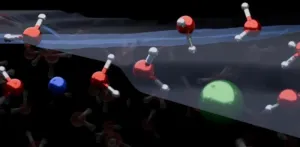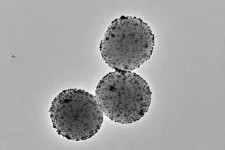(Press-News.org) Researchers have developed a platform that combines automated experiments with AI to predict how chemicals will react with one another, which could accelerate the design process for new drugs.
Predicting how molecules will react is vital for the discovery and manufacture of new pharmaceuticals, but historically this has been a trial-and-error process, and the reactions often fail. To predict how molecules will react, chemists usually simulate electrons and atoms in simplified models, a process which is computationally expensive and often inaccurate.
Now, researchers from the University of Cambridge have developed a data-driven approach, inspired by genomics, where automated experiments are combined with machine learning to understand chemical reactivity, greatly speeding up the process. They’ve called their approach, which was validated on a dataset of more than 39,000 pharmaceutically relevant reactions, the chemical ‘reactome’.
Their results, reported in the journal Nature Chemistry, are the product of a collaboration between Cambridge and Pfizer.
“The reactome could change the way we think about organic chemistry,” said Dr Emma King-Smith from Cambridge’s Cavendish Laboratory, the paper’s first author. “A deeper understanding of the chemistry could enable us to make pharmaceuticals and so many other useful products much faster. But more fundamentally, the understanding we hope to generate will be beneficial to anyone who works with molecules.”
The reactome approach picks out relevant correlations between reactants, reagents, and performance of the reaction from the data, and points out gaps in the data itself. The data is generated from very fast, or high throughput, automated experiments.
“High throughput chemistry has been a game-changer, but we believed there was a way to uncover a deeper understanding of chemical reactions than what can be observed from the initial results of a high throughput experiment,” said King-Smith.
“Our approach uncovers the hidden relationships between reaction components and outcomes,” said Dr Alpha Lee, who led the research. “The dataset we trained the model on is massive – it will help bring the process of chemical discovery from trial-and-error to the age of big data.”
In a related paper, published in Nature Communications, the team developed a machine learning approach that enables chemists to introduce precise transformations to pre-specified regions of a molecule, enabling faster drug design.
The approach allows chemists to tweak complex molecules – like a last-minute design change – without having to make them from scratch. Making a molecule in the lab is typically a multi-step process, like building a house. If chemists want to vary the core of a molecule, the conventional way is to rebuild the molecule, like knocking the house down and rebuilding from scratch. However, core variations are important to medicine design.
A class of reactions, known as late-stage functionalisation reactions, attempts to directly introduce chemical transformations to the core, avoiding the need to start from scratch. However, it is challenging to make late-stage functionalisation selective and controlled – there are typically many regions of the molecules that can react, and it is difficult to predict the outcome.
“Late-stage functionalisations can yield unpredictable results and current methods of modelling, including our own expert intuition, isn't perfect,” said King-Smith. “A more predictive model would give us the opportunity for better screening.”
The researchers developed a machine learning model that predicts where a molecule would react, and how the site of reaction vary as a function of different reaction conditions. This enables chemists to find ways to precisely tweak the core of a molecule.
“We pretrained the model on a large body of spectroscopic data – effectively teaching the model general chemistry – before fine-tuning it to predict these intricate transformations,” said King-Smith. This approach allowed the team to overcome the limitation of low data: there are relatively few late-stage functionalisation reactions reported in the scientific literature. The team experimentally validated the model on a diverse set of drug-like molecules and was able to accurately predict the sites of reactivity under different conditions.
“The application of machine learning to chemistry is often throttled by the problem that the amount of data is small compared to the vastness of chemical space,” said Lee. “Our approach – designing models that learn from large datasets that are similar but not the same as the problem we are trying to solve – resolve this fundamental low-data challenge and could unlock advances beyond late stage functionalisation.”
The research was supported in part by Pfizer and the Royal Society.
END
Accelerating how new drugs are made with machine learning
2024-01-15
ELSE PRESS RELEASES FROM THIS DATE:
Water molecule discovery contradicts textbook models
2024-01-15
Textbook models will need to be re-drawn after a team of researchers found that water molecules at the surface of salt water are organised differently than previously thought.
Many important reactions related to climate and environmental processes take place where water molecules interface with air. For example, the evaporation of ocean water plays an important role in atmospheric chemistry and climate science. Understanding these reactions is crucial to efforts to mitigate the human effect on our planet.
The distribution of ions at the interface of air and water can affect atmospheric processes. However, a precise understanding of ...
U.S. air pollution rates on the decline but pockets of inequities remain
2024-01-15
Over the last decades, air pollution emissions have decreased substantially; however, the magnitude of the change varies by demographics, according to a new study by Columbia University Mailman School of Public Health. The results indicate there are racial/ethnic and socioeconomic disparities in air pollution emissions reductions, particularly in the industry and energy generation sectors. The findings are published in the journal Nature Communications.
The research provides a national investigation of air pollution emission changes in the 40 years following the enactment of the Clean Air ...
New Scientific Reports publication reveals major difference in genomes of American and Chinese chestnut
2024-01-15
The chromosomes of American and Chinese chestnut are not so similar after all, at least in one key region of the genome – the nucleolus organizing region (NOR).
The finding, published in a forthcoming article in Scientific Reports, has major implications for anyone with the goal of conferring blight-resistance to American chestnuts through hybridization with the Chinese chestnut.
“This is an unprecedented finding in the field of plant cytology,” says Nurul Faridi, a Forest Service geneticist and lead author of the study.
Traditional ...
Solid-state qubits: Forget about being clean, embrace mess
2024-01-15
New findings debunk previous wisdom that solid-state qubits need to be super dilute in an ultra-clean material to achieve long lifetimes. Instead, cram lots of rare-earth ions into a crystal and some will form pairs that act as highly coherent qubits, shows paper in Nature Physics.
Clean lines and minimalism, or vintage shabby chic? It turns out that the same trends that occupy the world of interior design are important when it comes to designing the building blocks of quantum computers.
How to make qubits that retain their quantum information long enough to be useful is one of the major barriers to practical quantum computing. It’s widely accepted that the ...
Bladder tumors reduced by 90% using nanorobots
2024-01-15
Bladder cancer has one of the highest incidence rates in the world and ranks as the fourth most common tumour in men. Despite its relatively low mortality rate, nearly half of bladder tumours resurface within 5 years, requiring ongoing patient monitoring. Frequent hospital visits and the need for repeat treatments contribute to making this type of cancer one of the most expensive to cure.
While current treatments involving direct drug administration into the bladder show good survival rates, their therapeutic efficacy remains low. A promising alternative involves the use of nanoparticles capable of delivering therapeutic agents directly to the tumour. ...
Research sheds new light on Moon rock formation solving major puzzle in lunar geology
2024-01-15
New research has cracked a vital process in the creation of a unique rock type from the Moon. The discovery explains its signature composition and very presence on the lunar surface at all, unravelling a mystery which has long eluded scientists.
The study, published today in Nature Geoscience, reveals a key step in the genesis of these distinctive magmas. A combination of high temperature laboratory experiments using molten rocks, together with sophisticated isotopic analyses of lunar samples, identify a critical reaction that controls their composition.
This reaction took place in the deep lunar interior some three and a half ...
Priming, shaping and polishing: In search of a HIV vaccine
2024-01-15
Worldwide, an estimated, 40 million people live with HIV. Two-thirds of this group on the African continent. In 2022, more than 600,000 people died from HIV-related causes and more than 1.3 million were infected. There is no vaccine against the world's second most deadly infection, after TB. Thanks to a grant from the Bill & Melinda Gates Foundation, Amsterdam UMC's Rogier Sanders leads a project that aims to develop the first effective HIV vaccine.
"We hope to be able ...
Vigilant monitoring is needed to manage cardiac risks in patients using antipsychotics, doctors say
2024-01-15
Philadelphia, January 15, 2024 – The use of the antipsychotic drugs quetiapine and haloperidol is associated with an increased risk of ventricular arrhythmias and sudden cardiac death (SCD) caused by drug-induced QT prolongation, reports a new study in Heart Rhythm, the official journal of the Heart Rhythm Society, the Cardiac Electrophysiology Society, and the Pediatric & Congenital Electrophysiology Society, published by Elsevier. Caution is advised to manage cardiac risks in patients prescribed ...
Singapore study reveals impact of early life adversity on a child’s brain development
2024-01-15
Leveraging neuroimaging data from the Growing Up in Singapore Towards healthy Outcomes (GUSTO) cohort, researchers from A*STAR’s Singapore Institute for Clinical Sciences (SICS) identified an association between early life adversity and the pace of brain development in childhood.
SINGAPORE – A study led by researchers from A*STAR's Singapore Institute for Clinical Sciences (SICS) has found evidence suggesting that children exposed to elevatec levels of early life adversity (ELA) exhibit an accelerated pattern of brain development during the preschool years. When exposed to ELA, such as a mother's mental and ...
Researchers propose revised scoring system for recognising outstanding NHS clinicians
2024-01-15
A team of researchers has developed a new scoring system for a nationwide scheme, overseen by the Advisory Committee on Clinical Impact Awards (ACCIA), to recognise and reward senior doctors and dentists in England and Wales.
There has been a scheme in place since 1948 to reward senior clinicians who make an outstanding contribution to supporting the delivery of NHS goals. The awards have been known, through various iterations, as merit awards, clinical excellence awards, and, most recently, clinical impact awards.
Published ...




